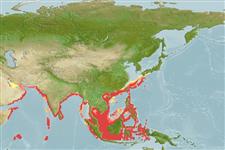Preferred temperature (Ref.
115969): 23.6 - 29.1, mean 28.2 (based on 1618 cells).
Phylogenetic diversity index (Ref.
82804): PD
50 = 0.5000 [Uniqueness, from 0.5 = low to 2.0 = high].
Bayesian length-weight: a=0.00776 (0.00636 - 0.00948), b=3.02 (2.98 - 3.06), in cm Total Length, based on LWR estimates for this species (Ref.
93245).
Mức dinh dưỡng (Ref.
69278): 4.3 ±0.67 se; based on food items.
Thích nghi nhanh (Ref.
120179): Trung bình, thời gian nhân đôi của chủng quần tối thiểu là 1.4 - 4.4 năm (K=0.18; Fec=385,000).
Prior r = 1.48, 95% CL = 0.98 - 2.22, Based on 1 full stock assessment.
Fishing Vulnerability (Ref.
59153): Low to moderate vulnerability (30 of 100).
Climate Vulnerability (Ref.
125649): High to very high vulnerability (75 of 100).
